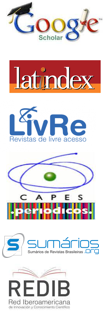Autismo no Espaço Escolar: Reflexões Sobre a Ação do(a) Pedagogo(a) no Processo de Inclusão da Criança Autista
DOI:
https://doi.org/10.17921/2447-8733.2023v24n2p322-325Resumo
O autismo ou o Transtorno do Espectro Autista (TEA) é diagnosticado através de análises que resultam nas alterações físicas e funcionais do cérebro, relacionando-se ao desenvolvimento motor, da linguagem e do comportamento, podendo ser diagnosticado em diversos níveis – do mais simples ao mais avançado – seja entre crianças ou adultos que executam seu convívio social em todos os locais – principalmente em ambiente escolar. Assim sendo, teve-se como objetivo geral, refletir sobre a importância da ação do pedagogo(a) no processo de inclusão do autista na escola. Desenvolveu-se uma pesquisa bibliográfica para gerar resultados para compreensão do tema em estudo, onde realizou-se estudos através de artigos científicos, dissertações e livros voltados ao tema. Diante disso, pode-se ter como resultado a compreensão de que o papel do pedagogo(a) em sala de aula ultrapassa as barreiras sociais, possibilitando um estudo mais direcionado as ações humanizadas entre o autista e os demais alunos(as). Contudo, para que o pedagogo e instituição de ensino possam cumprir um ensino eficaz com aplicabilidade da lei, requisitos metodológicos e melhores condições de convívio entre os públicos envolvidos, a participação dos pais e mães, amigos(as) e familiares devem prevalecer de forma efetiva nas ações escolares de inclusão, pois é através do respeito e humanização do convívio que o homem se reconhece como ser humano, e pode se respeitar entre os espaços e nas trocas de experiências, na convivência social que nasce das linguagens, conforme as necessidades.
Palavras-chave: Ensino. Isonomia. Transtorno do Espectro Autista.
Abstract
Autism or Autism Spectrum Desorder (ASD) is diagnosed through analyzes which result in physical and functional changes in the brain, relating to motor, language and behavior development, and it can be diagnosed at different levels - from the simplest to the most advanced ones - whether among children or adults who carry out their social life in all places - mainly at school environment. Therefore, the general objective was to reflect on the importance of the pedagogue's action in the process of including the autistic child in the school environment. A bibliographic research was developed to generate results for understanding the subject under study, where studies were carried out through scientific articles, dissertations and books focused on the subject. That said, there is the possibility to find as a result the understanding that the role of the pedagogue in the classroom goes beyond social barriers, enabling a more focused study of humanized actions between the autistic child and the other students. However, in order the pedagogue and educational institution can fulfill an effective teaching with applicability of the law, methodological requirements and better conditions of coexistence between the involved publics, the participation of the parents, friends and relatives must prevail in an effective way in school inclusion actions, since it is through respect and humanization of coexistence that people recognize themslves as a human beings, establishing respect among spaces and the exchange of experiences; also, social coexistence that is born of languages, according to ones needs.
Keywords: Teaching. Isonomy. Autistic Spectrum Disorder.
Downloads
Publicado
Como Citar
Edição
Seção
Licença
Copyright (c) 2023 Revista de Ensino, Educação e Ciências Humanas

Este trabalho está licenciado sob uma licença Creative Commons Attribution-NonCommercial-NoDerivatives 4.0 International License.


